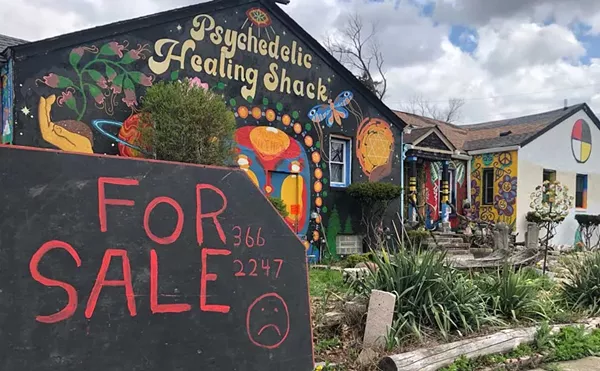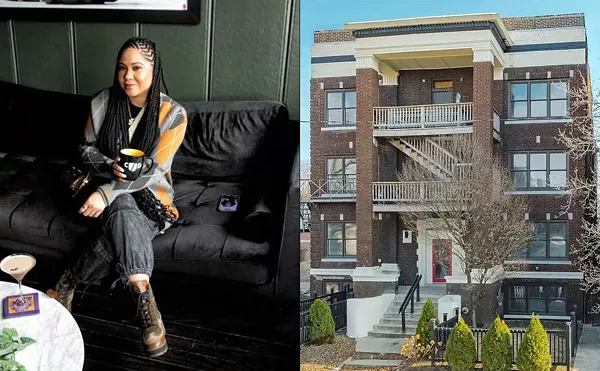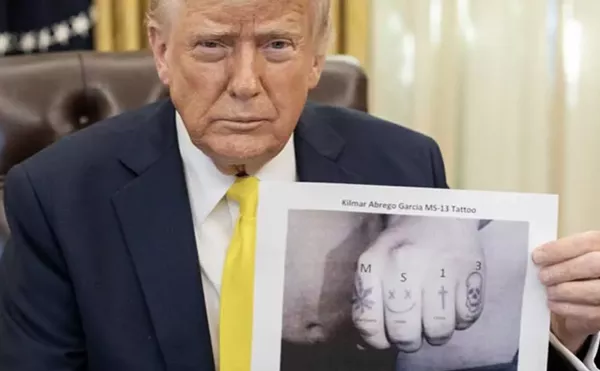
Audio By Carbonatix
[
{
"name": "GPT - Leaderboard - Inline - Content",
"component": "35519556",
"insertPoint": "5th",
"startingPoint": "3",
"requiredCountToDisplay": "3",
"maxInsertions": 100,
"adList": [
{
"adPreset": "LeaderboardInline"
}
]
}
]
Cliff Bell's opened in 1935, operating as a supper club until the late '60s. The space experienced a few different incarnations, one of which ended when a dead body was found in the since-replaced walk-in cooler. Today the name has been revived — and the club along with it. The Detroit landmark has been restored, reflecting the new owners' hard work. The result is a stylish, hip, cosmopolitan venue for music, classic cocktails and fine dining. It simultaneously represents the past and the present of the city.
Metro Times: What inspired you to open up downtown? Were you in the business before?
Paul Howard: I guess maybe it started because I came from a big family and we never went out much for dinner to restaurants, but a lot of my siblings worked in restaurants. I did as well, and I always liked restaurants and when I got older, bars. I saw an opportunity in Detroit because there just weren't a lot of places that I liked. I had a clear vision in my mind of what I'd like to have in a bar, the kind of place I'd enjoy as a customer. It seemed pretty achievable. My partner, Scott, and I got into the Bronx bar, so that's where I started.
MT: Is music a passion of yours?
Howard: I guess I do like music. I'm not a huge music fan. I like seeing live music. I guess you're wondering, "Why jazz?" Jazz is, in my opinion, the best music to see live, especially in a small setting. It's not too loud. The instruments are all agreeable to the ear, and there are lots of great musicians available. I'm not a huge fan of jazz. I don't listen to it much at home or in the car. But I sure like to see it live. That's where that came about.
MT: Not all of your entertainment is jazz. What's working the best for you?
Howard: The jazz works best. It's what fits the room best. We do book other things. The Moth is a big hit. It's storytelling night. It's very well organized. We always have a packed house for that. There's a national organization that essentially puts it on through WDET. They record it and they have a syndicated radio show. Basically what happens is that there is a topic for every event. People have five minutes to tell a story. It's unrehearsed. They come up on the stage and tell a story which is judged. The winners go on to a bigger competition which will occur after we've done six of these. Additionally, each story is recorded and may be used on the radio show. We've had a couple from here that were picked for the show. Out of 300 people in the audience, sometimes we have trouble getting 10 storytellers. Some people sign up ahead of time, but if there aren't 10 performers, we take names of volunteers from the audience, put them in a hat and choose enough to fill the show. The topic is advertised in advance.
We've done a lot of fashion shows. We did a great vintage bathing suit show that went very well. We did a custom women's hat show. We have occasionally a French night here which is based on our impression of what a French night would be. Basically it's champagne, balloons and gypsy jazz — 1930s Paris, Django Reinhardt.
MT: You're charging a cover charge, something that others are reluctant to do? Are you getting much resistance?
Howard: The cover charge is absolutely essential. We keep a guy on the door. We keep an in-house sound guy. We keep our equipment up. We maintain the piano. We've got great entertainment. We advertise it. In the end, the cover charge about comes out even on all of that. A lot of times people think that if they come out and have dinner, they shouldn't have to pay the cover if they spend a lot on dinner. The cover charge is really a separate charge, and it pays for a separate service. We go out on a limb and book really great entertainment. There are some nights we clean up on the door, and on other nights we know we're going to lose. In the end, we come out. If you go see a movie, it's $10. The symphony is $35 to $50. We book professional, talented musicians and we charge $10.
MT: What about downtown Detroit in general? What motivated you to open here in the city?
Howard: I'm already in Detroit. I grew up in Detroit. We've got the Bronx over on Second Avenue. I'm pretty deeply invested in the city. Before the Super Bowl, people were opening places for just a few days of business. We found out about this place in October. Within a week we became part of those people who were trying frantically to get open in time for the Super Bowl. We started construction on Oct. 5 and were open by Feb. 6. We've been working on it ever since. I would say that downtown has a lot of potential. I'm optimistic about this business, about Cliff Bell's. A lot of places that have opened since the Super Bowl are now gone. The momentum has not carried forward. Our business plan was based on things staying the same, and they have. They've not gotten better. There are a lot of opportunities, but we're trying to stay focused on what we've got.
MT: How do feel about the future of jazz in Detroit?
Howard: I've only been involved in jazz for three years, so I don't have a good enough historical perspective. I know there are a lot of promising young guys playing. We don't have problem finding good talent. Some of the guys that leave Detroit for New York and Chicago come in to play when they're in town.
MT: You didn't have a kitchen initially. How has the new kitchen impacted your business?
Howard: Initially we were just a jazz club. Now we're a supper club. We're focusing on the dining experience. We're starting to serve a lot of dinners. Our kitchen is open until 1:30 a.m. on the weekends and midnight during the week. We do a lot of small plates and appetizers — pass-and-share things. We encourage people to take their time, to spend the evening here. As far as the impact on our business, it's been the silver bullet here. Drinks were not enough. People never came in until 9:30 p.m. when the show started. Last Saturday, our dinner reservations started at 5 o'clock.
MT: All in all, how is the club doing?
Howard: Four years ago, this place was abandoned. Now it's fully operational. Are we out of the woods? Yeah, I think so. Is it a huge money-maker? Not yet. It's a tough business. It's an expensive place. The trouble is, people have a general sense that if you have a business, you also have money, when, in fact, it's the opposite. Lots of people see the place packed, but no one sees it empty. The place is built, and now we should be able to recover some of our investment.
Metro Times on Cliff Bell's in 2007:
The deep reds and bright golds, the mixture of blond and dark wood, the candlelit tables sitting below vaulted ceilings endowed with rich wood tones all smack of a more sensuous era, when patrons haunted such smoky little cabarets with relish. Even the pendulous, breast-shaped lamps with nipple-shaped finials titillate. The joint is a joyful anachronism, having enjoyed its early heyday back when you could get a grilled prime steer porterhouse for $6.
It's not hard to get lost in the illusion of being in the raw, bustling spirit of 1940s Detroit, when the Arsenal of Democracy was a crowded factory town churning out armaments. Back then, reformers clucked about Detroit as a city of clip joints, dance halls and cheap cabaret entertainment. Seeing that sort of gritty history capitalized on downtown is an exciting rarity.
Cliff Bell's is located at 2030 Park Ave., Detroit; 313-961-2543.





